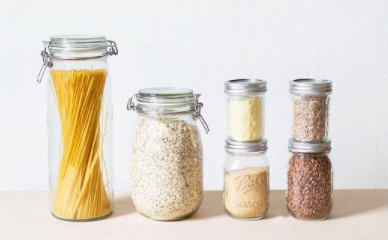We all want to do our bit in the fight to preserve our planet. There are more eco-friendly options than ever before, as businesses that offer eco-friendly solutions to daily struggles are thriving. Sustainability is a buzzword that is thrown around every day, but how many of us can truly say that our lifestyles are sustainable?
A big difference we can each choose to make each week is opting for groceries with less packaging. This option is becoming increasingly available, with Asda opening their new ‘Sustainability store’ a couple of months ago (see their article: Asda Opens New Sustainability Store). Here, customers can fill reusable containers with over 30 household staples, including Asda’s own brands of rice and pasta, as well as products from well-loved brands such as Kellogg’s, PG Tips, Quaker Oats, and Persil.
Hopefully, the numerous innovative initiatives championed at this new branch will be adopted in Asda’s other stores in the near future too, with other supermarkets following suit in the near future as well, as they aim to reduce their impact on the planet and offer options that align with the lifestyles of their more eco-conscious customers, who are growing in number every day. In this day and age, not only is this kind of business development kind to the environment, it also makes good business sense. By being at the forefront of this movement towards shopping with the environment in mind, Asda will undoubtedly reap the rewards, in the form of loyalty from customers wanting to reduce their environmental impact, and the economic benefits that come from that.

When it comes to zero-waste groceries, many of us have this idyllic vision of kitchen shelves full of beautiful glass jars filled to the brim with rice, pasta, dried beans, herbs and spices, sugar, flour, and all the other pantry staples. The idea that this is the only way to ‘do’ zero-waste properly holds many people back from making the switch. In reality, most of us probably already have all the containers we could ever need piled in the back of a cupboard somewhere – all those takeaway boxes you kept because, “they’ll come in handy for something” are perfect for storing enough herbs and spices to last you for months, and jam jars are perfect for storing things like peanuts, pine kernels or walnuts that usually come in plastic packets so small that you end up buying several packets for just one recipe! As a student, I took great pleasure in visiting my local zero waste store to fill up my various scavenged containers, and in fact this is the more environmentally friendly option – instead of buying fancy new containers, reuse ones you already have that will do the job just as well!
Not only is buying products from a zero-waste store better for the environment, it can also be better for your pocket too. Often, a portion of the price of a packaged item comes from the price of the production of the packaging itself, that the customer will just throw away once they’ve used what’s inside. When you buy zero-waste food, you don’t have to pay this, so the food itself is often cheaper than it would be if you were to buy it in a packaged form. There are, of course, exceptions, which is perhaps why the zero-waste option is seen by some as more expensive. However, this is usually because the zero-waste option is a better quality product, sometimes because it is an organic alternative, Fair Trade, or sourced locally rather than from halfway around the world. In the end, in my experience, buying products without packaging usually results in you saving money, which is a great added bonus!
If you’re not quite ready to make the transition to zero-waste, dip your toe in by choosing products with cardboard, or tin packaging rather than products with plastic packaging. Remember that all new plastic produced is a material produced from oil – a non-renewable fossil fuel that does not biodegrade. Instead, it breaks down into tiny particles known as micro-plastics, which often end up in rivers, lakes, and seas, entering the food chain by way of fish and other sea creatures ingesting them by accident. There are new materials being developed now that aim to render plastic a redundant material. These are often made from plant matter, meaning they are a sustainable and biodegradable alternative. At Vitabeam, we are aiming to do our bit to help the transition towards zero-waste by extending the shelf-life and improving the freshness of fresh produce without having to wrap it in plastic. This step will be a crucial way in which we can help to protect our planet, and we hope that you will join us in making small changes, such as choosing groceries with less packaging, that will add up to make a huge difference.